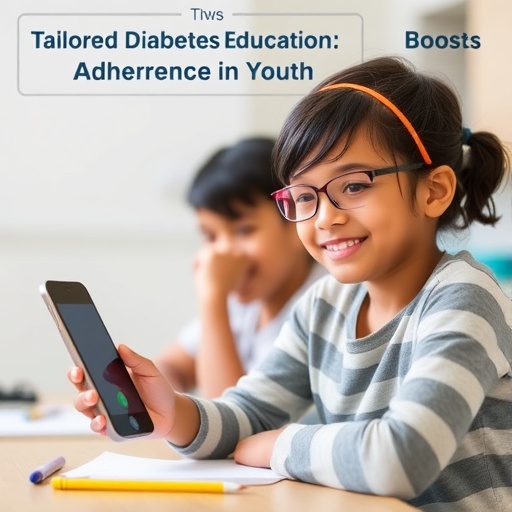In recent years, chronic conditions such as diabetes have posed significant challenges in pediatric healthcare, particularly regarding the management and treatment adherence among young patients. Diabetes, especially Type 1, necessitates lifelong management and self-care strategies, and this can be incredibly daunting for children and their families. A groundbreaking study conducted by Hassan et al. sheds light on a promising intervention that aims to bridge the gap between diabetes education and effective disease management, revolutionizing how healthcare providers can support children undergoing continuous subcutaneous insulin infusion (CSII).
The study meticulously examines the impact of individualized diabetes education tailored to the unique needs of children and adolescents who rely on CSII. By emphasizing the importance of customized educational approaches, the researchers sought to assess not only the participants’ adherence to treatment but also the resulting glycemic control—two critical metrics in diabetes management. The findings promise to lead to profound implications for future diabetes care strategies, emphasizing the need for personalized educational interventions.
Throughout this interventional study, the researchers enrolled a significant number of participants from a tertiary care center, ensuring a diverse representation of childhood diabetes cases. This diversity adds depth to the study, allowing researchers to draw more generalized conclusions about the efficacy of tailored education. Importantly, the study draws attention to existing gaps in traditional educational methods that often fail to engage young patients effectively. By honing in on a model that prioritizes individualized learning, the researchers aim to enhance patient empowerment and self-management skills.
One notable aspect of the research is the structured methodology employed to implement the educational interventions. Participants were exposed to comprehensive educational modules that included both theoretical knowledge about diabetes management and practical skills training. This dual approach was essential in promoting a holistic understanding of their condition, encouraging active participant involvement. Interactive sessions, personalized feedback, and continuous support were key components of the intervention, fostering an engaging learning environment that resonated well with the pediatric population.
The results from this prospective interventional study were promising. Participants who received tailored diabetes education exhibited significantly higher adherence rates compared to those who received standard educational interventions. This increased adherence was associated with improved glycemic control, emphasizing the link between effective education and better health outcomes. By highlighting the clear correlation between these factors, the research underscores the potential for targeted educational strategies to dramatically improve the lives of young diabetes patients.
Additionally, the study carefully analyzed the psychological implications of tailored diabetes education. Researchers noted that nurturing a confident and informed approach to diabetes management can enhance the overall mental health and well-being of children and adolescents. This holistic perspective is critical since chronic conditions can significantly impact emotional well-being and quality of life. The findings advocate for integrating psychological support into diabetes education, further promoting sustainable health management practices.
Furthermore, the advantages of this innovative education model are not limited to the patients themselves but extend to healthcare providers and families. Healthcare professionals equipped with effective teaching tools can engage better with patients, tailoring their approach to meet each unique family’s needs. Additionally, families can gain confidence in managing their child’s diabetes, as they receive specific tools and knowledge desirable for successful at-home care. This collaborative model fosters a supportive community centered around the patient’s health and enhances the overall treatment landscape.
Importantly, the implications of this study extend beyond pediatric diabetes care. The principles of tailored education could be applied to other chronic diseases, showcasing a potential shift in how healthcare providers approach teaching and engaging younger populations. Implementing patient-centered education models across other healthcare fields could lead to improved treatment adherence and outcomes, altering the trajectory of disease management for children significantly.
In conclusion, Hassan et al.’s study serves as a pioneering effort in advocating for tailored diabetes education among young patients. The evidence demonstrably links customized educational interventions to improved treatment adherence and glycemic control, setting a new standard in pediatric diabetes management. As healthcare continues to evolve, the findings from this prospective interventional study illustrate the vital importance of personalizing care to meet the unique needs of every patient. This innovative approach could potentially transform pediatric healthcare, providing children with the necessary tools to navigate their chronic conditions effectively and confidently.
As we move forward, further research will be crucial to explore the long-term impacts of tailored educational interventions on patient outcomes. Understanding how these methods can be refined and expanded will be vital in shaping the future of diabetes education and management. The findings from this study herald a significant shift towards a more compassionate, understanding, and effective healthcare system for children living with diabetes.
Subject of Research: Impact of tailored diabetes education on adherence and glycemic control in children and adolescents on continuous subcutaneous insulin infusion.
Article Title: Impact of tailored diabetes education on adherence and glycemic control in children and adolescents on continuous subcutaneous insulin infusion, prospective interventional study in a tertiary center.
Article References:
Hassan, M., ElHelaly, M., Badawi, N. et al. Impact of tailored diabetes education on adherence and glycemic control in children and adolescents on continuous subcutaneous insulin infusion, prospective interventional study in a tertiary center.
BMC Pediatr 25, 670 (2025). https://doi.org/10.1186/s12887-025-06018-4
Image Credits: AI Generated
DOI:
Keywords: Diabetes education, tailored intervention, children, adolescents, glycemic control, treatment adherence, chronic disease management.




